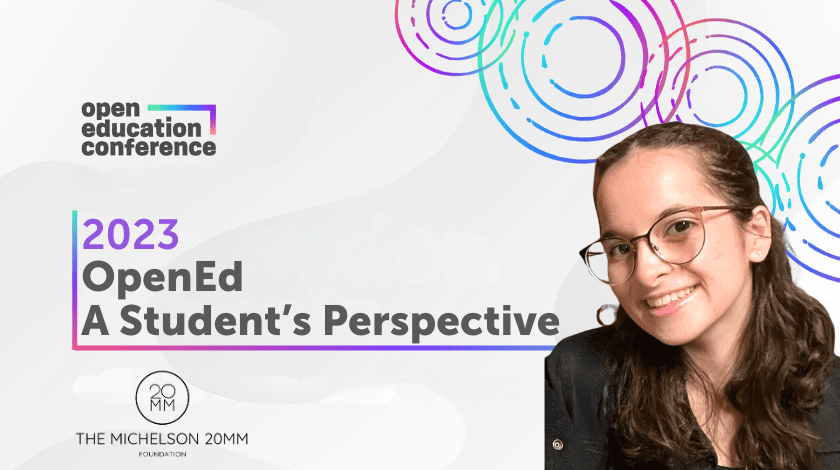News and Announcements
2023 Open Education Conference: A Student’s Perspective
Published Date
- December 14, 2023

By Kaitlyn Wagman
Just a few weeks ago, I was lucky to attend the 2023 Open Education Conference. This is not a space that students tend to know about, nor is it generally accessible to students due to registration fees and content being catered toward administrators and educators. Student power, however, is imperative in conversations surrounding inclusive and accessible higher education. Through my fellowship at the Michelson 20MM Foundation, I was able to participate in the conference, where I gained plenty of knowledge that would serve my fellow students in advocacy work or in their educational journeys.
Though every session I attended had new and critical information, two presentations particularly caught my eye: “Foregrounding Indigenous Perspectives on Open Education” and “Breaking Down Barriers: Advancing Open Education through the Power of AI and OER.” In the former, the presenters shed light on how the idea of “open” could actually have harmful effects on historically marginalized communities. They noted that higher education in the U.S. and Canada have been used to exploit the voices of BIPOC folks, specifically indigenous communities. They argue that as we move forward with expanding the use of OER, we have to be careful to safeguard indigenous knowledge against colonial-settler thought. This is a perfect example of intention versus impact, and it’s something that I will keep in mind as I move forward with my own advocacy.
“Breaking Down Barriers: Advancing Open Education through the Power of AI and OER” (Robertson Hornsby) gave me perspective on how developing technology can be used to further education accessibility. As someone who is not well-versed in technology, the idea of AI is quite nerve-wracking. This presentation highlighted how we can move forward with AI to help students sort through and understand the vast amount of information in OERs. Roberson Hornsby notes that this can help the diverse needs of learners, but that we have to be careful with data privacy and transparency when using this technology. I’m not an expert on using tech like this, so I can admit that the idea of integrating AI further into education does frighten me in terms of my own online protection. That said, this is something for all of us to consider as we create more initiatives for higher education accessibility and affordability.
In my own presentation with Melody Rood, “Inclusive Access: Neither Inclusive Nor Accessible,” I spoke about the dangers of automatic textbook billing, often hidden within the guise of “Inclusive Access.” At my university (the University of California, Los Angeles), the bookstore uses this model, through which students are automatically opted-in and must opt-out if they do not want to be charged for their textbooks at the price the bookstore sets, per a contract with the publishing companies. Though the bookstore claims that this program allows students to access their textbooks at a “discounted price,” such discounts are unknown due to the confidential nature of the contracts with textbook publishing companies. The presentation I also addressed the data concerns with this program, especially when homework is wrapped into the course materials. Since students must accept the terms and conditions to access their homework, they are forced to agree to providing their data for the publishing companies’ internal research purposes. All of this to say, the term “Inclusive Access” is often used to get the most money out of students with the greatest benefit to publishing companies.
In the future, I hope that there will be more student-led and student-targeted programs. Additionally, I look forward to seeing the Open Education Conference continue to expand to include students, who are arguably most impacted by these issues. I believe that expanding outreach for the conference to capture the student population will go a long way in getting more people involved in the fight for open education.
Overall, I found this conference enlightening and informative. I will take the lessons I learned to continue to think critically and engage my peers. Students deserve accessible and affordable education, which encompasses a diverse set of thoughts and subjects. OER is a hot topic in my own university, and I hope that it continues to grow and expand for years to come.
Michelson 20MM is a private, nonprofit foundation working toward equity for underserved and historically underrepresented communities by expanding access to educational and employment opportunities, increasing affordability of educational programs, and ensuring the necessary supports are in place for individuals to thrive. To do so, we work in the following verticals: Digital Equity, Intellectual Property, Smart Justice, Student Basic Needs, and Open Educational Resources (OER). Co-chaired and funded by Alya and Gary Michelson, Michelson 20MM is part of the Michelson Philanthropies network of foundations.
To sign up for our newsletter, click here.